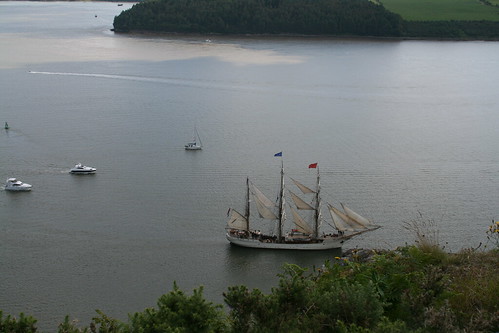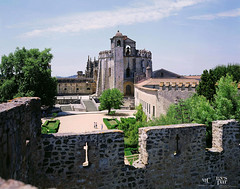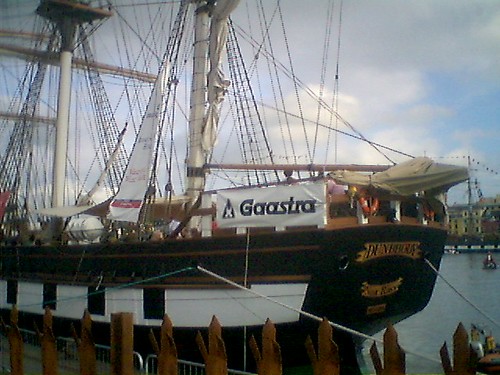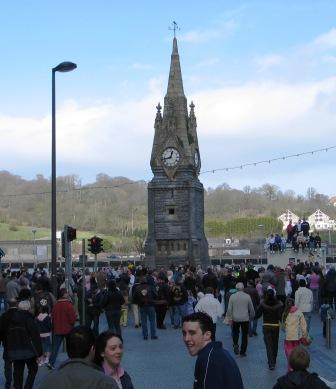13 March 2012
Google Scholar Page
I just enabled my Google Scholar Page: Mícheál Ó Foghlú - Google Scholar Citations.
I had previous enabled by ACM personal profile: Mícheál Ó Foghlú - ACM Author Page.
26 October 2011
We mourn three giants in October 2011
Three great men have passed away this month, all leave huge influence behind them on humanity and our continued journey in our use of tools. They contributed to the core foundational principles of computing, and to the design of products that led to the widespread adoption of the resulting technologies by the general public. I think software is a very strange thing, that we don't consider too often, layers of abstraction and tools that allow the creation of digital artefacts that change our lives. Of course hardware is needed too, but software itself must surely be studied more in social sciences as one of humanity's most productive inventions, not yet equal to natural language in impact on our history, but harnessing our natural linguistic abilities and turning them towards an engineering purpose - pure magic. Perhaps more accurately software should be seen as the latest incarnation of mathematics, our first artificial language, made alive through the ability to actually execute on hardware. In any case, we stand on the shoulders of giants.

The BBC reported this week on the death of John McCarthy, arguably the founder of Artificial Intelligence (AI), and the creator of LISP, still one of my favourite programming languages. He died 24th October 2011, at the age of 84. See also the Guardian Obituary. AI was my first love in computing, and I have huge respect for the power and simplicity of LISP for exploring this vast field.

Earlier this month, the BBC also announced the death of Dennis Ritchie, creator of the C programming language and co-creator of UNIX at Bell Labs, who died on 12th October 2011. See the Guardian Obituary. I fell in love with UNIX (and the Internet) in the mid-80s in university in Keele, and it has been the stable OS underpinning nearly everything I have done with computing since then, not least the Mac OS X MacBook I am using now to type this blog post. Again it is a powerful and generative tool, based on simple principles.

Perhaps most well covered in the popular press, Steve Jobs of Apple who died at the early age of 56, on the 5th October 2011. Through arguably the most impressive range of product launches in the history of computing, he has driven the adoption of the key technologies in computing by the general public, opening up the excitement and wonder of the potential for these technologies to all of us, not just the academics. See the Guardian Obituary. I love my iPod, iPhone and iPad as well as my OS X machines, and I love the fact that computing was democratised by the personal computer.
We will not see their likes again, to paraphrase what we say in Irish.
3 July 2011
Tall Ships in Waterford
Waterford had a very busy weekend from Thursday 30th June 2011 to Sunday 3rd July 2011 as the quays in the city centre hosted the start of the Sail Training Interational Tall Ships Race 2011.
I was up early on Sunday morning, standing on the green road between Cheekpoint and Passage East, to see the parade of sail as the ships came past to Dunmore East. This Flickr Set of photos captures most of the tall ships as they passed by.
16 November 2010
Activity Levels
Well I never thought the day would come, but my blogging levels have dropped significantly due to a number of factors:
- Things are very busy in TSSG (the usual), and I'm trying to delegate taks to allow more room for....
- I'm very involved now as CTO of FeedHenry, so that's an extra job
- I'm using Yammer a lot for internal TSSG and FeedHenry information sharing.
- I'm using Twitter a lot, especially when at an event and sharing experiences, or when promoting an event or a document (I know lost of people reported Twitter stealing blogging time, I never thought it would be me though).
Despite all that I intend to make some time to compose some longer posts that are better suited to the blog, and to a general audience.
17 September 2010
University Rankings
There has been a news flurry in Ireland recently in response to the launch of this year's QS university rankings on 8th September 2010, that placed Cambridge at number one, the first time a non-US university had held the spot.
http://www.topuniversities.com/university-rankings/world-university-rankings/2010/results
More recently the THES launched the updated THEWUR (Times Higher Education World University Rankings) and this continues to have US dominance, with Harvard in the first place slot.
http://www.timeshighereducation.co.uk/world-university-rankings/2010-2011/top-200.html
This is a nice visualisation showing the US and UK dominance of the THEWUR:
http://globalhighered.wordpress.com/
Note that QS did the rankings for the THE for the past 5 years, but this year the THES used Thomson Reuters for the first time. Harvard had been in first place for the previous five years in these rankings that QS published in association with Times Higher Education.
The concern in Ireland has been about slippage of our universities down these rankings, and the belief that this trend will continue if current university under-investment continues.
This Irish Times reported that 2 Irish universities are in the top 100 THEWUR:
Thu 16th Sep 2010: TCD at 76 and UCD at 94.
Ireland was ranked at 17 in the world for the overall quality of its higher education system. The US topped this ranking. The QS university rankings placed TCD at 52 and UCD at 114.
26 April 2010
Extended China Visit
Well, trust me to be on the longest trip away I had been on for about 6 months when disaster struck European airspace with volcanic ash meaning lots of flights were cancelled. So ended up being away from home for 2 weeks instead of 1 week.I was with some WIT colleagues visiting Dalian in north east China (see out TSSG weblog entry for details).
I came back to Beijing to get my onward flight to Dublin via Abu Dhabi with Etihad Airways, and I was told at midnight on Saturday the 17th April that my flight was cancelled, and that was not allowed to even go on the first leg of the journey to Abu Dhabi (despite having a boarding card generated via online check-in), and that my payment had been refunded and I was on my own. This is not what I expect as a customer when this type of incident happens, I expect some help and support from the airline. So much for customer service. So there I was on my own in a strange city with nowhere to stay and no knowledge of the local language spoken or written (I'd only been in Beijing the previous Tuesday for a transfer to another flight).
Luckily, I managed to get myself a booking at an excellent hotel in the city centre, the Park Plaza (very near the shopping area of Wangfujing and walking distance to the Forbidden City), to get a taxi to take me there, and I spent a week waiting for the WIT travel agent, FCM Travel Ireland, to be able to come up with an alternative way home. Eventually I secured a full-price (just shy of €2k) flight home with Lufthansa via Frankfurt the following Saturday. Quite expensive given my original return was only just over €1k.
Well I worked out a schedule where I would get up a bit late, do some touristy things, have an early dinner around 6pm local time, and then work in the evening when the timezone overlapped with home (4pm local time as 9am in Ireland). This has meant that haven't come back to huge email backlog, though obviously I do have lot of meetings to catch up on (I get around 100 per day, many of which do actually require responses).
I really enjoyed the opportunity to see Beijing, taking in the Forbidden City, the Great Wall (at Mutianyu) and some other cool sights. But I really missed being away from my family. I was really glad to touch down in Frankfurt in the EU27 on Saturday afternoon, and then in Dublin a few hours later.
The photo shows me at the Great Wall, Mutianyu section, which was the highlight of the trip, from a tourist perspective. Equally impressive was the evidence of investment and development in China both in Dalian and in Beijing. You certainly get a feel for China as a happening place, as so many people are saying. I really hope China can figure out how to share its wealth among all its 1.3 billion people, and help everyone, not just a privileged few. Bust I guess I should focus on putting our own house in order in Ireland first, where we've let the wealth gap extend too much during the boom years.
I will have to think long and hard before flying Etihad Airways again -- they did nothing to help me, not even honouring my valid ticket with them for the first leg of my journey home! Buyer beware.
A big thank you to FCM Travel Ireland and to Lufthansa for getting me home safely.
8 January 2010
3D Objects Representing Social Data
A facinating illustrated article about 3D visualisation of data, as Christmas ornaments russell davies: datadecs.
21 October 2009
Convent of Christ, Tomar, Portugal
I am attending (and speaking and chairing some sessions) eChalenges 2009 in Istanbul, Turkey.Just heard a talk on digitising artefacts at this UNESCO world heritage site in Tomar, Porugal, the Convent of Christ. What struck me most was the beautiful slides so I thought I'd share the Flickr stream with the world :-)
27 August 2009
Bernie Goldbach disusses eReaders and the ePub format
Inside View from Ireland: Late Night in the ePub This is a call to arms to embrace the open ePub format, and stop Amazon's Kindle from dominating the market with a locked in DRM format for electronic books.
11 August 2009
Mortality and Scholarship
Over the course of today, whilst working on my doctorate (on Irish research funding policy) the two most thought provoking things I have read have been obituaries in the Guardian. Two very different scholars who gave a lot to the world: Ivan Illich (born September 4 1926; died December 2 2002) and Bernard Crick (born 16 December 1929; died 19 December 2008). I first read books buy both authors in the 1980s (Illich: De-Schooling Society, Crick: In Defence of Politics), and only discovered today that both authors had died, even though it was quite recently for Crick, and it was quite a while ago for Illich. If that isn't a suitable note to finish on for the day, I'm not sure what is.
10 August 2009
On the Importance of Taxonomies
Carol Kaesuk Yoon on the importance of taxonomies to science and to language itself in the New York Times: Reviving the Lost Art of Naming the World - NYTimes.com
27 January 2009
ceatra.ie on Internet Tropes
Well this was an interesting read:
"First, Goodwin’s law. In its original form, it stated that as a usenet discussion grows longer, the probability of a comparison involving Nazis or Hitler approaches one. One evolution is that it is now applied not to usenet discussions (of blessed memory) but, first, to all internet discussions, and then to debate in general. And another evolution is the qualification that, once the comparison occurs, the debate is automatically ended and whoever made the comparison has automatically lost."
24 October 2008
Advent 4211 Netbook
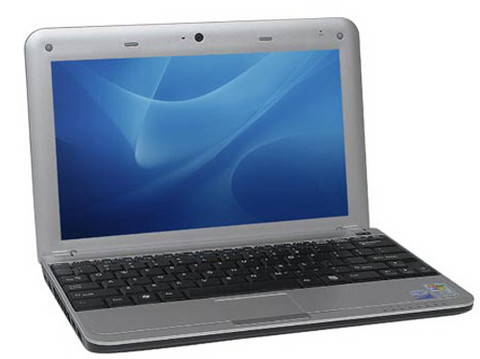
There is key change happening in the world of end user devices for the Internet. Here I am not talking about the move to smart phones, and the possibility that much Internet access in the future will be from such mobile devices rather than from desktop and laptop PCs - though that is indeed an important trend. No, I am talking about the rise of a new type of devices that bridges the gap between a mobile phone and a laptop - a mini-laptop, or sub-laptop, called a netbook.
This movement may have been started by Nicholas Negroponte's OLPC (One Laptop Per Child), but its effects are now seen in the lauch in 2007 of the Eee PC, a netbook with limited hardware, but a fully functional laptop with a keyboard, screen and trackpad/buttons nevertheless.
The second iteration of netbooks, with many other providers jumping on this bandwagon, were launched in the summer of 2008. I purchased one of these, an Advent 4211, effectively a re-badged MSI Wind, for €365 (including 2 years warranty) from pixmania.ie, including VAT and delivery. This came with Windows XP Home, a 1024x600 screen (but VGA out to drive larger screens if needed), an Intel Atom N270 processor, 1GB RAM, 80GB hard disk. Note that other MSI Wind models have solid state storage rather than hard disks, but I went for the Advent that only came with a traditional hard disk. Note that many netbooks use Linux Operating System rather than Windows, Advent only comes with Windows, but I've since installed kubuntu as a dual-boot alternative.
The good things about the netbook are:
- It is very light (1.3kg) and small enough to balance on one knee;
- It is a fully featured Operating System (Windows or Linux) so can run any application that those OSs support;
- It has a fully functional keyboard;
- You can open it fully on an economy aircraft table;
- It is so cheap you could consider buying one for many purposes, for example unobtrusive seating room use;
- The SDHC slot can take up to 16GB cards that help to make up for the lack of optical drives (CD/DVD).
The main negatives are:
- No optical drive (CD/DVD)l
- Cheap tracker pad and buttons take some getting used to;
- Limited screen size, especially the 600 pixel height, does inhibit some types of applications;
- Battery life is poor at just over 2h on a full charge - there may be a newer better battery which would be a good upgrade if doing a lot of mobile working.
My conclusion was that it was perfect for me as a lightweight travel laptop. Also it provided me an ideal opportunity to experiment with the use of Linux as a primary laptop/desktop.
I installed kubuntu (Hard Heron) from an external USB DVD, on the machine and came across a number of issues. One was an issue that had bothered me on some ubuntu desktops before. I use IMAP email, and typically I use either Apples Mail.app or Mozilla Thunderbird. Over the years I have optimised my email folder structure using underscores to put important folders earlier in the sort order. the default settings in ubuntu and kubuntu (when I had set my location as Ireland) was for a strange sort order where the underscore files sorted as if there were no underscores. I had investigated this briefly before, and concluded that this was an underlying OS issue, rather than a application issue. The spotlight fell on the "locale" settings. After discussing this with Rotan Hanrahan, who happened to have Open SuSE installed on his laptop, we managed to figure out that what I needed was to set the locale variable "LC_COLLATE" to a value of "POSIX" rather than "en_IE.UTF-8". In kubuntu this can be changed using:
$ sudo update-locale LC_COLLATE=POSIXand restarting the X-Windows session. This worked a treat leaving my locale settings as:
LANG=en_IE.UTF-8 LANGUAGE=en_IE:en LC_CTYPE="en_IE.UTF-8" LC_NUMERIC="en_IE.UTF-8" LC_TIME="en_IE.UTF-8" LC_COLLATE=POSIX LC_MONETARY="en_IE.UTF-8" LC_MESSAGES="en_IE.UTF-8" LC_PAPER="en_IE.UTF-8" LC_NAME="en_IE.UTF-8" LC_ADDRESS="en_IE.UTF-8" LC_TELEPHONE="en_IE.UTF-8" LC_MEASUREMENT="en_IE.UTF-8" LC_IDENTIFICATION="en_IE.UTF-8"So that I could access my Euro symbol, and the accented characters I needed for Irish (e.g. my own name), but the sort order I was expecting was restored.
So now all I need to figure out is how to get the sort order fixed on applications like Thunderbird in OS X :-)
12 June 2007
50,000th Issue of Guardian: A Moral Compass for the Digital Media Age?
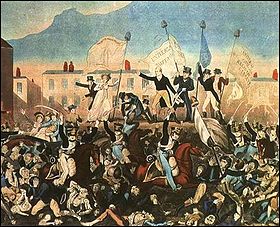
I read yesterday's Guardian. This was the 50,000th edition of the newspaper, first published as the Manchester Guardian on 5th May 1821. The paper is justifiably proud of its leadership role in articulating liberal opinion over its long history, and of its role in defending the freedom of the press in the UK. It is equally proud of its role in the vanguard of the new media, being the leading online UK newspaper with many readers oversees.
In a strange synergy, I only recently listened to the excellent BBC podcast of the In Our Time discussion of the so-called Peterloo Massacre (BBC In Our Time Podcast), nearly two years earlier on 16th August 1819 and pictured above. This event was pivotal in the Guardian's history, as it inspired the founder John Edward Taylor to establish the paper as a forum for political debate. The Wikipedia Article on the Peterloo Massacre gives the background of the reform movement and the massacre.
I have added below some extracts from the front page article in the Guardian that places the Guardian within its historical context Napoleon to Iraq, and still going strong | 50,000 | Guardian Unlimited.
In 1821, John Edward Taylor, who had written the first eyewitness account of Peterloo, managed to raise the capital to print some 1,000 copies of the Manchester Guardian - intended, according to the prospectus, to be read by "the class to whom, more especially, advertisements are generally addressed".
...
Today's Guardian is, each month, read by 16 million "unique users" (Scott would wince), nearly a third of them in America. In the years since the great editor wrote those words - ever forward looking as others looked back - the Guardian has moved from being a provincial morning paper (albeit with a remarkable international reputation) to being the most-read British newspaper website in the world. On this new digital frontier more Americans read the Guardian today than read the Los Angeles Times.
...
We're with the grand old man: what a change, what a chance! The liberal values the Guardian has represented since 1821 are the same values which the new technologies today make possible: plurality of voice; diversity of opinion; an internationally shared discourse; a voice for the hitherto voiceless; a challenge to authority; freedom of speech and information; fairness and tolerance; the possibility of enlightened argument without legal or state restraint. All these are now imaginable, if not yet universal. The liberal imperative to promote them has never been more vital.
Stirring words indeed, and a lesson to all of us who work in information communications technologies and media to key a weather eye on our own moral compass, and have a strong view on what is best for all of our society.
1 May 2007
Ireland 21 in Economist 2007 e-Readiness Rankings
The Economist Intelligence Unit in co-operation with the IBM Institute for Business Value have released the 2007 e-Readiness Rankings.
The full PDF Report is available for download.
Interestingly Ireland has dropped from 16th to 21st place, fitting the overall trend is for Asia to catch up on North America and Western Europe. However, the criteria have changed so direct comparison with previous rankings may be invalid....
Defining the next generation of e-readiness
Several new ranking criteria have been introduced to the e-readiness model in 2007, and primary categories have been changed. In addition, some individual criteria have been retired or had their weighting reassessed.
We have refined our notion of connectivity. It remains a defining indicator of how a country's population is able to access the Internet and digital channels; the more telephones and Internet accounts a country has, the easier that e-readiness is to achieve. But it is also true that certain types of connectivity are proving better than others in enabling e-readiness. Broadband Internet access enjoys greater influence in 2007 - not only its penetration, but also its affordability to households. We have also eliminated fixed-line phones as an indicator and increased the weight of mobile penetration, as mobile phones are generally cheaper, easier to access and, with text messaging and mobile commerce applications, increasingly powerful digital devices.
Another key refinement has come in our analysis of the part that legal structures play in creating e-ready economies. We have also placed greater emphasis on the role of governments in fostering digitalisation, both as providers of vision and policy direction, and also as creators of digital channels for their constituents.
Lastly, we have re-focused the consumer and business adoption category to evaluate the utilisation of digital channels by individuals and businesses. We have also slightly increased its weight relative to connectivity and other categories in recognition of the fact that, ultimately, it is actual users who determine a country's ereadiness, not its networks.
27 April 2007
Together Since 1957
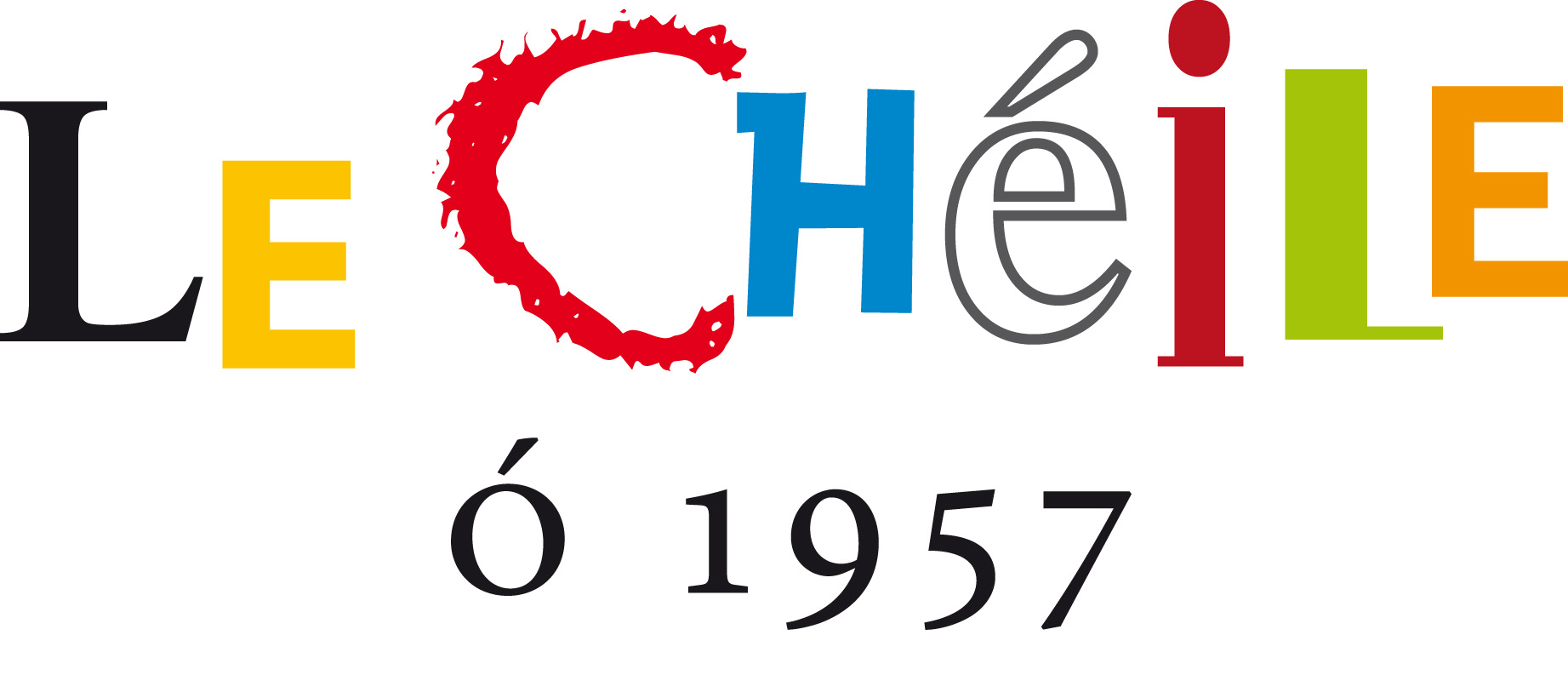
This is the Irish version of the EU logo celebrating the 50th anniversary of the Treaty of Rome. You can also see all versions of logos here.
2 April 2007
April Fools: Google TiSP

Well this is the best April Fools I've seen this year, though I only saw it today Welcome to Google TiSP. Install your own Google broadband by putting a cable down your toilet! Google said its "Toilet Internet Service Provider" (TiSP) - code-named "Dark Porcelain" - works with Microsoft's new Windows Vista operating system. But sorry - septic tanks are incompatible with the system's requirements.
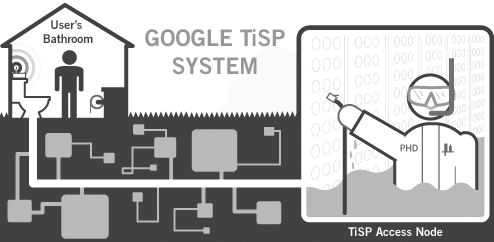
And some media commentary.
29 March 2007
Read the Treaty of Rome
Well this is a good suggestion, if we are serious as EU citizens about what the EU is or could be then we should actually Read the Treaty of Rome, as antoin suggests:
This is the 50th anniversary of the signing of the Treaty of Rome. Let's be honest. Nobody cares about the Treaty of Rome. But the Treaty of Rome is the foundation of the peaceful, growing Europe we know today. Everyone who cares about Europe should read at least a few sections of it. It's actually pretty readable. If you are interested in commercial law, Title VI is worth reading.
So here is a link to the Treaty of Rome and another to the Wikipedia entry on the treaty, including a copy of original signatures.
Open Source Licencing
The debate about the GNU General Public License (GPL) Version 3 rolls on. A third draft of GPLv3 was released yesterday (28th March 2007) for discussion.
This article has a nice summary with onward links to further articles on related topics Controversy Swirls Around Changes in GPLv3.
It seems that many people in the open source community (including Linus Torvalds) are planning to stick with version 2 of the license (dating back to June 1991), but also that the strange deal between Microsoft and Novell on Windows and SUSE (see also the announcement) has stirred up deep resentment in the open source community that the spirit of the original license was being subverted, and that the new version 3 license tries to make this illegal in future. The version 3 license also tries to outlaw certain Digital Rights Management (DRM) issues. All quite confusing, but I'll track these developments with interest.
I have been a big fan of open source in general, ever since downloading GNU utilities for Unix in the mid 1980s as an undergraduate student in the University of Keele in Staffordshire, UK - the final year students were allowed to use Unix! Even then I marveled at the achievements of the collaborative communities involved. Since then, like many others, I've been impressed by Richard Stallman's continuing commitment to free software (open source) in the FSF (Free Software Foundation), and by the interesting analysis of the benefits of open source from Eric Raymond's "The Cathedral and the Bazaar", bust most of all I have also been impressed by the huge success of individual open source efforts including:
- GNU "unix" utilities and GNU CC;
- the Linux kernel;
- web servers like CERN httpd and then Apache and other projects in the Apache Foundation;
- email programs like sendmail/postfix;
- web browsers like Netscape and then Mozilla Firefox;
- email clients like Mozilla Thunderbird;
- dynamic languages like Perl, Tcl/Tk, PHP, Python, and Ruby;
- the opening up of IBM's approach through software development IDE Eclipse;
- the opening up of Sun Systems' activities in terms of both Solaris and Java (c.f. earlier blog post on Sun's coming out as a major contributor to open source according to an EU sponsored survey).
And for an interesting discussion of the most important open source activities see this earlier blog post on bloggers nominating their candidates as the three most influential open source projects.
25 March 2007
Treaty of Rome - 50 Years
In my St. Patrick's Day posting about what it means to Irish, which I argued that one good way to find out to to dip into our rich literature written in both Irish and English, I placed the issue of Irelend's identity within a European context, the membership of the European Union (or the European Economic Community as it used to known) being one of the most significant issues for Ireland in the past 100 years, other than independence from the British Empire.
Now it seems that this type of thinking is very appropriate as the papers this weekend were full of discussions about the 50th anniversary of the signing of the Treat of Rome that created the original European Economic Community. For example this editorial in the Irish Times (subscription required) ireland.com - The Irish Times - Sat, Mar 24, 2007 - How stands Europe at 50?.
Well, I have always felt the noble ideal of creating a common super-national entity to bring together former enemies (primarily France and Germany), to prevent another world war, was an inspired one. Yes I know that economically the post-war recovery in Europe was helped by American investment as well, and that was welcome as well.
I don't really mind how many Eurosceptics bash the EU, I think that is a noble ideal, and the best experiment in the world today about how 22nd century world government could be organised - a voluntary relinquishing of national sovereignty to a wider entity in the hope creating an environment for peaceful cooperation. All of us who are citizens of the EU should get involved and make it work!
17 March 2007
St Patrick's Day Musings: What Ish My Nation?
Famously, an Irish soldier, MacMorris, in Shakespeare's Henry V exclaims:
Of my nation! What ish my nation? Ish a villain, and a bastard, and a knave, and a rascal. What ish my nation? Who talks of my nation?
This quotation is often used in literary discussions of what it means to be Irish (particularly in the post-colonialist context e.g. 'What ish my nation?': Towards a Negative Definition of Irish Identity by Eugene O'Brien).
Traditionally the Irish media, on this day and indeed the rest of this week, 17th March St. Patrick's Day, we are often treated to discussions of what it means to be Irish. Whilst we are not yet as confused as the English/British seem to be (which is not necessarily a bad thing, by the way, and I personally can claim British citizenship as well as Irish though I choose not to). However, there is certainly an impression that we Irish are becoming more confused as to our national identity.
The truth is that, as a comparatively young nation, coming into existence in the early 20th century, we have a recent written tradition that defines the national identity. This "Irish literary revival," the flowering of literature and cultural activity at the end of the 19th and the start of the 20th centuries, is now seen in retrospect as a fundamental part of the process of creating an environment where independence became possible. Although some of the literature of this period may now seems idealistic and distant from "modern Ireland," it is still a rich tradition to draw on. In combination with this more recent literary and cultural heritage, we have a long oral and written history going back two thousand years and more; the Irish language being one of the oldest written languages in Europe. I find that most Irish people are not fully connected with this, and that Irish language enthusiasts often promoted the wrong parts of this tradition.
For me Ireland now shares most aspects of a wider trans-national European culture. When I travel in Europe I always learn new things about its rich cultural heritage, but I still feel strangely comfortable in countries where I cannot speak a word of the native language (most recently for me Slovenia); but when I travel outside of Europe I definitely feel like a foreigner (for me most recently South Korea).
One could muse about how this common European culture was formed. Obviously the Roman Empire united much of what is now Europe (but not Ireland). Subsequently the Christian Church (particularly though its adoption as the state religion of the Roman Empire) provided a pan-European cultural norm that lasted until the end of the Middle Ages, and the Reformation introduced a new paradigm. Since then a common membership of a scientific and modernising culture, linked to the 19th century European empires (such as the British and the French) and finally the integrated European project that is the EU, has bound Europe together culturally. Indeed most European legal systems derive from Napoleonic models. Ireland, on the fringe of Europe, but part of the largest world empire of all, the British, was the first part of that empire to break away. This was a complete political schism in the end, neutrality during the second world war, rejecting the Commonwealth, whilst maintaining unique political and cultural links. In a way Ireland has much in common with Canada, Australia (and to a lesser extent India), all parts of the old British empire.
We effectively rejected our own language in the period of our greatest austerity after the great hunger (the Famine of the mid 19th century); Irish speaking families brought up their children speaking English in the hopes of enabling emigration to English speaking Britain, America, Canada and Australia - an implicit emigration for opportunity policy (a default mode of operation for Ireland up to the 1990s) that could be argued has worked given the strength of the resultant Irish diaspora. In the census' taken since 2000 the Irish population is increasing for the first time since the huge blow of the famine when nearly half of either died or emigrated.
Now Ireland is the poster child of the EU - look what we can do - transform an agriculturally dominant stagnant economy with most of its children leaving to work abroad (Ireland in the 1980s) into a globalised economy leading the world in terms of ICT and biotechnological innovation (with the help of our American friends) - a bridge between Boston and Berlin, a model of the 21st century state, in balance with the external forces that threaten to rip many counties apart. And of course the EU has prevented further war in EU (except for the fall-out in Yugoslavia, and that was before it was partially absorbed into the EU).
Of course, if you actually count the unbroken years of operation of a democratically elected government Ireland is actually one of the older nations in Europe, but we think of ourselves as young, perhaps this is the anthropomorphic use of the American cultural ideal of the teenager and the young?
So, to help those lost souls searching for the core of Irish identity, in the honourable tradition of weblog listings, I offer up this list of books and poems that each have something to say on the topic, whether directly or indirectly. In no particular order, and each with some personal musings, I give you:
- [<1000-1300 Old and Middle Irish] The Táin translated by Thomas Kinsella (These are the stories of Cu Cuchulain, the Ulster Cycle of old Irish poetry, fantastic, and exotic, a must read. It is hard to give a date for this as some of the original poems passed through the oral tradition from periods potentially BC. The two primary manuscripts we have date from the 11th and 14th centuries, c.f. Wikipedia Entry:
The Táin Bó Cúailnge has survived in two main recensions. The first consists of a partial text in the Lebor na hUidre (the "Book of the Dun Cow"), a late 11th/early 12th century manuscript compiled in the monastery at Clonmacnoise, and another partial text of the same version in the 14th century manuscript called the Yellow Book of Lecan. These two sources overlap, and a complete text can be reconstructed by combining them.
Well, you just have to read that don't you?) - [1729 - English] A Modest Proposal Jonathan Swift (Swift's satirical argument that the solution to the Irish famine was to eat some of the children was taken as a serious proposal by some readers at the time.)
- [1911 - English] The Crock of Gold, James Stephens (A fantastic tale set in rural Ireland, that pokes fun at the traditional elements of Irishness whilst honouring them).
- [1914 - English] Dubliners, James Joyce (I've included this as you have to read Joyce, but Ulysses, or Finnegan's Wake, can be a daunting task! So instead dip into this collection of short stories, or just read the last one, "The Dead". It is hailed by many as the best collection of short stories ever. I love the incidental details such as bottles of Guinness being placed by the fire so that the cork can raise out by itself and bring the drink to the right temperature in "Ivy Day in the Committee Room" - a healthy antidote to modern chilled stout).
- [1916 (1889-1939) - English] Easter 1916, William Butler Yates (This is a single poem Yeats wrote at the time of abortive uprising in Dublin in Easter 1916, arguably the defining moment politically for modern Ireland. If you want this in a bigger volume try Selected Poems and Four Plays of William Butler Yeats that contains selected poems and four verse plays including "Words on a Windowpane". Some of this stuff can still bring one to tears, it is woven into our cultural fabric in so deep a fashion.)
- [1939 - English] At Swim-two-birds, Flann O'Brien (A really funny book. One part is based on a translation of a Middle Irish text, Buille Suibhne, The Madness of Sweeney; another on the legendary Finn McCool, or Fionn mac Cumhaill.)
- [1975 - English] North Seamus Heaney (Heaney, a Nobel laureate, has always focused on what it means to be Irish, and is perhaps more gut trustingly honest about it in the earlier poems such as those in this volume.)
- [1981 - English] Translations, Brian Friel (A colleague of Heaney's on the Field Day project, Friel is perhaps Ireland's best playwright of the 20th century, and this play is a masterpiece. It's best to actually go an see it performed if possible, but the script is good to read too - though you do need a bit of practice to enjoy reading plays in my experience. It is set at the period when British army forces are preparing an ordinance survey map of of an Irish-speaking part of Ireland.)
- [1990 - English] Ireland, 1912-1985: Politics and Society, Joseph J. Lee (A very influential recent history of Ireland.)
In researching this post I found this excellent site: Island Ireland. This an excellent resource for Irish literature, with many useful links. Note that I've updated this entry over 17th and 18th March, as I filled in the details of why I like each text...
6 March 2007
Hillary NY - Gradam na mBloganna 2007
At the Irish Blog Awards 2007 Hilary NY won the award for "Best Use of Irish in a Blog". Good to see the Irish language making use of the new technology, and cool that Hilary is based in New York - there's the modern Ireland for you (or is that the old Ireland - no or would that be Cape Cod where my own relatives are)..... I see she's been blogging since December 2004. Adh mór...
26 January 2007
Nerd Scores
So I score less than Shane R was right, I'm a machine enthusiast (Ordo Ab Chao)
Umm, not sure what that tells us....
5 December 2006
University of Leuven's Guided Independent Learning
brochuregil.pdf (application/pdf Object)
Leuven is one of the oldest universities in Europe, and this PDF document describes their approach to learning - very interesting!
Advertising Revenue on Internet Tops $4 Billion 2006 Q3
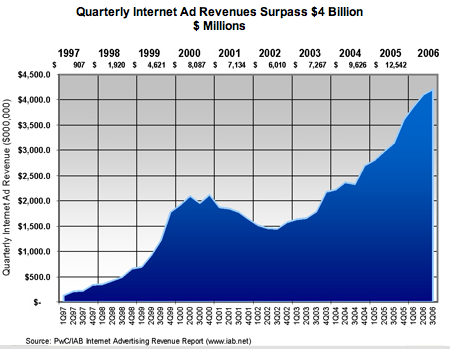
From John Battelle's weblog John Battelle's Searchblog: Internet Revenue Breaks $4 Billion.
Online revenues hit $4.2 billion in Q3, up 2 percent over Q2 earlier this year ($4.1 b), Interactive Advertising Bureau and PricewaterhouseCoopers LLP announced today. This quarter is also 33 percent higher than $3.1 billion in Q3 2005.
Sheryl Draizen, SVP and General Manager of IAB, notes, "Marketers are experiencing how this medium enhances their ability to target and engage the audience that matters to their brand and then measure its effectiveness in ways no other medium provides."
28 November 2006
Terminology for Research (What is Basic Research?)
I have been working on some research into the analysis of science, engineering and technology funding policy in Ireland in the period 1996-2006. As part of this research I've done some work on the issues around terminology. Here's an extract from an internal report I've written that may be of some more general interest. The issues are informed by my experiences in the TSSG, where we conduct most of our research in Pasteur's Quadrant and in Edison's Quadrant.
Issues of terminology around the idea of "Basic Research" in Science, Engineering and Technology
Science, Engineering and Technology (SET) are related academic disciplines that address various parts of the innovation lifecycle where new ideas and theories are formed and (some of which) are applied in order to help solve real world problems. All three often use various types of mathematics as a tool, for example calculus and statistics. Science attempts to explain observed and unexplained phenomena, often creating mathematical models of observed phenomena, and using a scientific method to propose a hypothesis derived from a model that can be tested and thus acquire new supporting evidence for the model or a falsification of the hypothesis and thus the model. Technology and engineering are attempts at practical application of knowledge (often from science), usually involving the construction of artefacts such as physical products and software solutions. Often modern products combine physical and software components in one form or another (e.g. cars, TVs, computers).
Simplistically it could be said that scientists work on science; and that engineers work on technology; few academics are exclusively labelled technologists, usually an academic's background education will determine whether he or she is labelled a scientist (qualifications BSc, MSc, PhD) or an engineer (qualifications BEng, MEng, PhD). However, there is in practice a blurring of boundaries between science and engineering, and it quite normal for some scientists to become involved in the practical application of their discoveries arguably behaving as engineers. Similarly, in the process of developing technology engineers often need to explore new phenomena, and thus arguably behave as scientists.
When discussing science, engineering and technology research policy one is faced with an interesting situation. What starts off as a seemingly relatively well defined problem space quickly disintegrates into a morass of ambiguity and analogy. One of my previous assignments dealt in detail with one study that focused entirely on the meaning of the term "basic research" to researchers and to policy makers (Calvert, 2002).
The definitions of research and experimental development encapsulated in the Frascati Manual (OECD, 2002), have dominated formal documents addressing scientific research in most countries in the world from the first edition of the manual over forty years ago (OECD, 1963), and through a series of subsequent editions up to and including the sixth edition (OECD, 1970; OECD, 1976; OECD, 1981; OECD, 1994; OECD, 2002). Whilst the scope of the Frascati Manual is the measurement of the financial resources used for research and experimental development, its impact has been on the use of terminology in policy documents, terms of reference of funding bodies, and on the terminology used in the discussion of research and experimental development (R&D) in general. The basic definition of R&D in the current edition of the manual is:
"Research and experimental development (R&D) comprise creative work undertaken on a systematic basis in order to increase the stock of knowledge, including knowledge of man, culture and society, and the use of this stock of knowledge to devise new applications." (OECD, 2002, Par. 63)
The manual goes on to define three tiers of R&D activity, each with differing time horizons to potential exploitation: basic research, applied research and experimental development. Furthermore basic research is subcategorised into pure basic research and oriented basic research.
"Basic research is experimental or theoretical work undertaken primarily to acquire new knowledge of the underlying foundations of phenomena and observable facts, without any particular application or use in view." (OECD, 2002, Par. 240)
"Oriented basic research may be distinguished from pure basic research as follows: + Pure basic research is carried out for the advancement of knowledge, without seeking long-term economic or social benefits or making any effort to apply the results to practical problems or to transfer the results to sectors responsible for their application. + Oriented basic research is carried out with the expectation that it will produce a broad base of knowledge likely to form the basis of the solution to recognised or expected, current or future problems or possibilities." (OECD, 2002, Par. 243)
"Applied research is also original investigation undertaken in order to acquire new knowledge. It is, however, directed primarily towards a specific practical aim or objective." (OECD, 2002, Par. 245)
"Experimental development is systematic work, drawing on knowledge gained from research and practical experience, that is directed to producing new materials, products and devices; to installing new processes, systems and services; or to improving substantially those already produced or installed." (OECD, 2002, Par. 249)
Whilst these definitions have been fairly stable over the various editions of the manual, more recent versions have added text acknowledging the lack of clear boundaries between the seemingly separated types of research activity defined:
"There are many conceptual and operational problems associated with these categories. They seem to imply a sequence and a separation which rarely exist in reality. The three types of R&D may sometimes be carried out in the same centre by essentially the same staff. Moreover, there may be movement in both directions. When an R&D project is at the applied research/experimental development stage, for example, some funds may have to be spent on additional experimental or theoretical work in order to acquire more knowledge of the underlying foundations of relevant phenomena before further progress can be made. Moreover, some research projects may genuinely straddle categories. For instance, study of the variables affecting the educational attainment of children drawn from different social and ethnic groups may involve both basic and applied research." (OECD, 2002, Par. 251)
Similarly, the manual originally focused on engineering and the natural sciences, but more recent editions of the manual have addressed software (a new discipline that has emerged a major player in technology since the 1980s) and social sciences (an older discipline that is now recognised as essential for mapping the relationships between science and society, and of studying society itself) as well. Other areas, in particular in the humanities, are still not represented in the Frascati definitions. Essentially, as governments have pushed to fund these types of research, they have been retrofitted to be included in the definitions.
"In recent years, the desire for better information on R&D in service activities has been expressed. The basic definitions in this Manual were originally developed for manufacturing industry and research in the natural sciences and engineering. Specific problems therefore arise for applying them to service activities, which often involve software applications and research in the social sciences." (OECD, 2002, Par. 25)
Whether one agrees with this terminology or not, it has had a strong impact of how any debate about R&D has been framed in the past forty years. In particular, these are the definitions used when compiling statistics about research and experimental development spending in OECD countries, so any use of these statistics in support of an argument often also involves an implicit agreement with the terminology and definitions. Indeed the authors of the manual are consciously aware of its influence in this regard: "Furthermore, by providing internationally accepted definitions of R&D and classifications of its component activities, the Manual contributes to intergovernmental discussions on 'best practices' for science and technology policies." (OECD, 2002, p. 3).
More recently the work of Stokes (1997) on Pasteur's Quadrant has been very influential on policy especially in the USA. The principle Stokes espouses is that the two most common concepts used to define basic research should be treated as two separate axes defining four rather than two potential terms, allowing greater nuance and more precise usage. The two axes are the utility of research (basic = aimed at no use, applied = aimed at use) and the understanding of domain that the research seeks to evolve (basic = fundamental, applied = not fundamental) are used as two axes so that there are two binary responses on each axis:
A) Quest for fundamental understanding?
B) Considerations of use?
A=Yes B=No Pure basic research (Bohr's Quadrant)
A=Yes B=Yes Use-inspired basic research (Pasteur's Quadrant)
A=No B=Yes Pure applied research (Edison's Quadrant)
A=No B=No Taxonomies and other activities that help the discipline itself
Adapted from [Stokes, 1997, p. 73]
It is interesting that Frascati and the SFI in Ireland have used the term strategic oriented research that seems to map precisely to Pasteur's Quadrant - a basic research activity in terms of its fundamental nature but strategically targeted at some potential use.
References
Calvert, J (2002) Goodbye Blue Skies? The Concept of 'Basic Research' and its Role in a Changing Funding Environment University of Sussex, DPhil
OECD (1963) Proposed Standard Practice for Surveys of Research and Development: The Measurement of Scientific and Technical Activities, OECD: Paris.
OECD (1970) Proposed Standard Practice for Surveys of Research and Experimental Development: The Measurement of Scientific and Technical Activities, OECD: Paris.
OECD (1976), Proposed Standard Practice for Surveys of Research and Experimental Development: "Frascati Manual 1976", The Measurement of Scientific and Technical Activities Series, OECD: Paris.
OECD (1981) Proposed Standard Practice for Surveys of Research and Experimental Development: "Frascati Manual 1980", The Measurement of Scientific and Technical Activities Series, OECD: Paris.
OECD (1994) Proposed Standard Practice for Surveys of Research and Experimental Development, "Frascati Manual 1993", The Measurement of Scientific and Technological Activities Series, OECD: Paris.
OECD (2002) Proposed Standard Practice for Surveys of Research and Experimental Development, "Frascati Manual 2002", The Measurement of Scientific and Technological Activities Series, OECD: Paris.
Stokes, DE (1997) Pasteur's Quadrant: Basic Science and Technological Innovation Brookings Institution Press: Washington DC
2 October 2006
Smart Homes of the Past
This (tongue in cheek) photo captures a smart home of the past.23 September 2006
Raymond Baxter RIP (1922-2006)
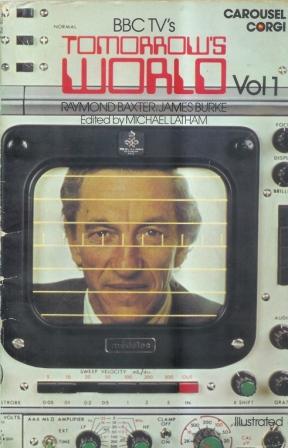
I read in today's Irish Times that Raymond Baxter passed away on 15th September 2006 (he was born on 25th January 1922). As a child I was inspired by his TV appearances, along with James Burke, in particular heading up the first editions of Tomorrow's World (the BBC science programme). Here's a BBC Posting announcing the sad news. See this site for information on Tomorrow's World.
In many ways it was inspirational people like this, as well as my own school teachers, who encouraged me to pursue science initially as a topic for academic study. Hence I still have the two volume edition of the book based on the series (see scanned image at the top of this posting). So it inspired me to do A-Level Physics, along with Irish and English, and I also took a non-examinable Computing course at the same time, as computing was not yet available as an A-Level subject). I went on to study a BA in Computing and English (Keele University, Staffordshire, UK) followed by further postgraduate computing courses in the UK.
Raymond Baxter (Guardian, Obit)
21 September 2006
Rechargeable USB AA Batteries! Cool.
Paul Watson in the TSSG alerted me to these new USB batteries TrustedReviews - USBCELL: Batteries That Recharge Through USB. That is a really great concept if they can reach the right price point. I've already started noticing that recharging via USB is becoming a de facto standard for all sorts of devices such as GPS receivers, mobile phones, PDAs and many other hand held devices. Making the batteries themselves plug in is a great idea...15 September 2006
Breathing Earth
Breathing Earth tries to capture real-time data about the earth and display it visually on a map.... very interesting.
14 July 2006
SignOfTheTimes
This picture is of a sign near the Holy Cross pub on the Cork Road (en route from Cork to Waterford, near the outskirts of Waterford city). It's actually down the side road (the cork road is bigger than this...) map. The road has a local GAA club (a sports field where they play Gaelic football) and so there's a warning about children running across the road (but the sign used for this in Ireland looks like you are supposed to aim to aim to hit the children with your car, c.f. Warning Signs). Ironically this warning has no impact on the speed limit that remains at 80km, the legal maximum for a non-primary route. So the combined result of the signage is that it looks like you should speed up and try and hit the kids!
8 July 2006
Meadhbh Brónagh Ní Fhoghlú
Our daughter Meadhbh Ní Fhoghlú is now just over 7 months old, born at the end of November 2005; here's a recent picture of her looking fairly happy! For those who don't know much about Irish pronunciation, the Anglicised spelling of Meadhbh may be easier to understand - Maeve.28 June 2006
Windows-based Disk Image Tools
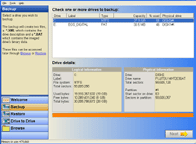
Every so often I have to redo a technical task where all the tools have changed since the last time I did it. Recently this happened with the requirement to migrate from a 60Gig hard disk to a 100Gig one in my Tablet PC laptop. I have done this type of task very frequently with various types of Unix file systems, including the Linux ext2 and ext3 filesystems, and I know how to safely copy files or sectors and keep boot partitions working and so forth. The complication here was that NTFS did not let me do a simple recursive copy (when I attached the old and the new disk to a desktop m/c via USB 2.0 - the easiest for me) due to permissions, and I didn't have a suitable tool for direct sector copying (i.e. just imaging the disk) on Windows XP.
After investigating various tools, many of which required a reboot in some customised boot environment for safely repartitioning the current live boot disk (a problem I did not need to address) and finding that these new boot environments didn't support my USB mouse/keyboard, or the USB 2.0 to IDE disk controllers I had, I stumbled upon this excellent utility: DriveImage XML. Well, this sorted the problem easily, I just pointed at the source and destination disks, having selected a direct copy from drive to drive. The copy took a few hours. Then I just had to mark the new partition active with the standard MS XP disk tools (they also provided a copy of bundled with the utility just in case) and my laptop booted with the new disk perfectly - it even auto resized the partition to the new disk size, so I didn't have to do any further messing with the partitions. So in this case the search for the right tool, and wondering about the right approach, took longer than the task itself, as often happens with systems adiministration.
So I'd recommend DriveImage XML for managing Windows filesystems on a Windows XP box. Looks like it can also take a snapshot image of a working system for later restoration if necessary. What impressed me was the professionalism of the product (despite it being free) both in terms of usability and documentation.
DriveImage XML is an easy to use and reliable program for imaging and backing up partitions and logical drives.The program allows you to:
# Backup logical drives and partitions to image files
# Browse these images, view and extract files
# Restore these images to the same or a different drive
# Copy directly from drive to drive
# Schedule automatic backups with your Task SchedulerImage creation uses Microsoft's Volume Shadow Services (VSS), allowing you to create safe "hot images" even from drives currently in use.
Images are stored in XML files, allowing you to process them with 3rd party tools. Never again be stuck with a useless backup!
Restore images to drives without having to reboot.
DriveImage XML runs under Windows XP Home, XP Professional and Windows Server 2003 only. The program will backup, image and restore drives formatted with FAT 12, 16, 32 and NTFS.
By the way, there is of course a place for the other tools I didn't use that create separate boot environments. Most famous of these for Windows-based machines is BartPE for which many plugins exist for different system administratio tasks requiring a separate boot environment.
WinPE and BartPE:
WinPE (Windows Preinstallation Environment) is a stripped down version of WinXP or Win2003 that can be booted from the CD. It provides a win32 environment and can acccess both FAT and NTFS volumes. But it is only available for microsoft OEM customers. As a replacement with enhanced functionality, Bart Lagerweij has created PEBuilder which can build a similar environment using WinXP or Win 2003 installation CD. This created environment is called BartPE. BartPE can do everything WinPE can do and more. It supports plugins(search BartPE Plugins),so that you can add your custom applications that run in a Win32 environment such as EasyRecovery 6, antivirus such as Mcaffee, Nod32, and other applications such as Drive Image 2002, Symantec Ghost 8 and more into the CD. This allows us to create a complete disaster recovery solution in one CD. This is the reason that this site has more content of BartPE than any other solution. The current status of the BartPE plugin database is always displayed on the left of this page.MultiBoot CD:
A multiboot CD is simply one which upon booting, presents a selection of bootable options such as BartPE, WinPE, 911CD, R.I.P. Linux, DOS bootfloppy images, and more. The user can then select the appropriate option to continue booting. This allows us to create one CD or DVD which can hold a number of seperately bootable components such as BartPE, or one of the Acronis bootable Media or more. I have written a basic tutorial which describes the process of creating one such multi-bootable CDs using one of the best tools available - Bootable CD Wizard by reanimatolog.
Of course all this is just the equivalent of rebooting into a single user mode in Unix where you can do low level disk partition type activities safely. I guess if you have the mental concepts for what is possible, relearning new tools for specific requirements is relatively easy.
Just a mention of some other approaches to this problem: g4u (ghost 4 unix) (NetBSD-based boot environment with disk tools) and PartImage (Linux-based boot environemnt with disk tools - NTFS is "exterimental").
22 June 2006
12 Byzantine Rulers
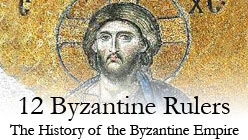
An excellent set of podcasts explaining the history of the Byzantine Empire: 12 Byzantine Rulers (The History of The Byzantine Empire by Lars Brownworth).
13 June 2006
Boardgames (Settlers of Catan)
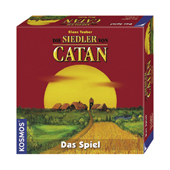
It is nice to see a renewed interest in strategic board games, the physical nature of this type of gaming makes it more real than much computer-based gaming. Martin Fowler on Boardgames: MF Bliki: BoardGames
In the last year or so I've been getting back into board games. If the phrase 'board game' conjures up Monopoly or Risk in your mind, that the wrong image. I played board games a fair bit in my teens, but even then I had little time for such poor games. My taste then led to Diplomacy and Kingmaker - but then drifted off into simulation war-games and D&D. My recent re-ignition has been around German-style Board Games, ironically fed by my old D&D group in the UK. While we've been over here for a few weeks we've had the chance to do a good bit of board gaming - it's tougher in the US as we don't have a group of friends in the Boston area who are into board games.
A community, focused in Germany, developed around designing board games in the 80's or so with a particular set of principles. The idea is to make board games that have interesting tactics and strategy, yet are easy to learn, play in a couple of hours, stay fresh with multiple plays, and keep everyone fully engaged till the finish. This style really flowered with a game called Settlers of Catan in 1995, and now there are quite a few excellent games in this category, many of which are recognized by the Spiel des Jahres award.
...
For most readers of the this blog, the best game to try to see if you like this sort of thing is Settlers of Catan - the game that's paved the way for this genre around the world. You can learn how to play in ten minutes of play and be competitive in your first game. However there's lots of room for skill as you choose between multiple strategies which have to change as other people make their moves. The board represents an abstract island on which you build settlements and cities, for which you need resources that the island provides. The island is dealt out differently each time, which helps keep the game varied. You also get resources by trading with other players, which keeps the game very interactive. We've played it a couple of dozen of times, often night after night, and so far it hasn't got stale at all.
I have the orginal German edition of The Settlers of Catan (Die Siedler von Catan) and its two expansion packs: Cities and Knights (St臈te & Ritter) and Seafarers (Seefahrer). These all have coloured wooden pieces, and the board is made of hexagonal cardboard that can build up a unique map as the settlers explore.
Image of Settlers of Catan game in progress
As well as the German boardgame revival, I love the card games such as Steve Jackson's Illuminatii. I've had many's a long night playing this with family and friends. The only problem these days is lining up people to play and time to do it :-)
6 May 2006
How to Quote in an RSS/Atom Feed Content
Bill de hモra on There's no such thing as neutral content:
"lets look at how I quoted Rick. I started with his name and post title, followed by the quote. That style of quoting - "someone at this link said this: - " is quite deliberate. I call it "Ruby Quoting", since I picked it up from reading Sam Ruby's weblog. The reason I use it is because this post will be pumped through any number of aggregators including ones that will strip out the structure and indentation that makes the quote visually distinctive, as is the case with traditional media like print, or with HTML web pages. At quick glance or topline scanning (typical reading modes for feeds), the quote can be mistaken as your words. The lead in helps avoid that from happening."
Interesting, I'll try adopting this style of quotation.
9 July 2005
Tall Ships: Parade of Sail
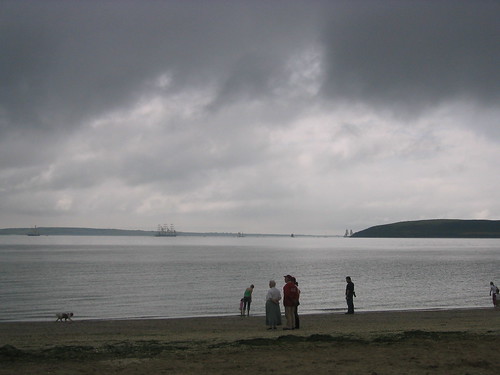
Early this morning between 7am and 8am the Tall Ships left Waterford and set sail down the river Suir towards the estuary. They headed out past Cheekpoint, Crook, Passage East, Ballyhack and assembled at Dunmore East between 10am and 1pm before going off to race to Cherburg in France this afternoon from offshore of Hook Head at 2pm.
Note that the expression "by Hook or by Crook" comes from Cromwell's statement about how to take Waterford city, by Hook Head or Crook Head (the former being on the County Wexford side of the estuary and the latter on the County Waterford side) c.f. origin of "by hook or by crook".
The whole Tall Ships event has been very successful by all informal feedback and media-filtered feedback I have heard. It was enjoyable for the locals, for the visitors who came to see the Tall Ships and for the crews and helpers on board the various vessels. I think it's given the people of the South East a feel for what can be gained by organising a big event like this, and I hope to see more of the same in the future.
8 July 2005
6 July 2005
Tall Ships in Waterford

The Tall Ships race is starting in Waterford this year and the place is buzzing with visitors... For a taster try out these webcam feeds of the quays: webcam1 webcam2.
For info on the race: Tall Ships.
19 June 2005
Irish language and the EU
Irish Examiner: Front Page in Irish
On 12th June 2005 the Irish language was made an official working language of the EU (specfically it was upgraded from a "treaty" language, into which all formal treaties need to be translated, into a "working" language, into which important documents need to be translated).
Chinnigh an tAontas Eorpach (AE) st疆as oifigi仡l agus oibre don Ghaeilge don ch饌d uair riamh.
[The EU has granted Irish official working status for the first time.]
I know that many will argue about the value of spending money on things like this, but personally I am glad that Irish has the same status as the languages of the new member states, and it is often too easy to underestimate the value of culture and of language. One of Europe's greatest collective treasures is its culture and its language and it is right that these languages should be recognised within the EU. What is stranger to me is that various Irish governments took so long to negotiate this status....
12 May 2005
Geographically mapping a conference
O'Reilly Radar > ETech 2005: Where Did They All Come From? discusses the issues around (semi-)automatically processing conference atendees to map where they come from and analyse, for example, the mean distance travelled.
3 May 2005
Great Book Cover Site
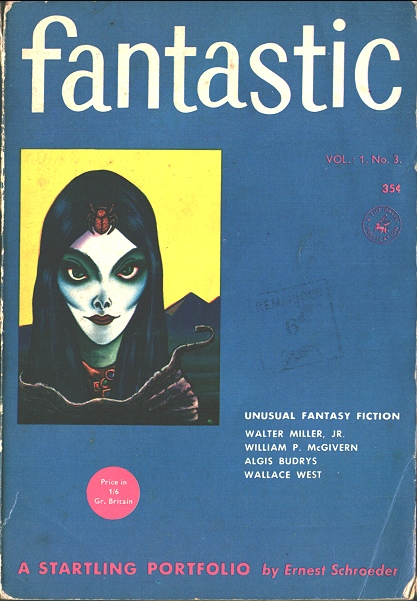
Inspired by by recent posting on Edgar Rice Burroughs' John Carter of Mars science fiction novels, I came across Jim Barker's site of old book and magazine covers scanned in manually! A treasure trove of pulp and other things.
24 April 2005
Analysing the Sales of Computer Books
In O'Reilly's new Radar RSS aggregation Tim himself has published an interesting analysis of computing books sales 2003-2005: O'Reilly Radar >Book Sales as a Technology Trend Indicator. This highlights some very interesting high level and low level trends: the computer book sector now seems to be on the up again; perl and python books are both declining, python is catching up on perl. Well worth a wee look :-)
20 April 2005
Papal Domains for Auction on eBay
Now that we have a pope the fun begins: Netcraft: Papal Domains for Auction on eBay, Sedo
It didn't take long for popesquatters to try and cash in on domains related to the new pope, Benedict XVI. The PopeBenedictXVI.com domain is for sale on eBay, with a starting price listed at $100,000, and a "buy it now" price of just $250,000.
16 April 2005
India on Intellectual Property
Cory Doctorow posting the following article: Boing Boing: India's amazing statement on IP and international development. It is refreshing to see the reasons behind IP being explored in the the context of sensible sustainable development policies. The posting quotes the statement made by India on Intellectual Property at a recent meeting of the UN World Intellectual Property Organisation (WIPO) meeting:
The real "development" imperative is ensuring that the interest of Intellectual Property owners is not secured at the expense of the users of IP, of consumers at large, and of public policy in general. The proposal therefore seeks to incorporate int international IP law and practice, what developing countries have been demanding since TRIPS was forced on them in 1994.
The primary rationale for Intellectual Property protection is, first and foremost, to promote societal development by encouraging technological innovation. The legal monopoly granted to IP owners is an exceptional departure from the general principle of competitive markets as the best guarantee for securing the interest of society. The rationale for the exception is not that extraction of monopoly profits by the innovator is, of and in itself, good for society and so needs to be promoted. Rather, that properly controlled, such a monopoly, by providing an incentive for innovation, might produce sufficient benefits for society to compensate for the immediate loss to consumers as a result of the existence of a monopoly market instead of a competitive market. Monopoly rights, then, granted to IP holders is a special incentive that needs to be carefully calibrated by each country, in the light of its own circumstances, taking into account the overall costs and benefits of such protection.
4 April 2005
Insects and Entropy
This is an excellent parable about complexity and computing Insects and Entropy. Thanks to Bill
28 March 2005
MS to buy Groove Networks
Shane Dempsey notes that Microsoft to buy Groove Networks. He cross references a full article on this in Grid Computing Planet.21 March 2005
US Basic Research Funding
This posting discusses basic research funding in the USA Computing Research Policy Blog: Industry Continues to Push for Basic Research, White House Growing Defensive
17 March 2005
St Patrick's Day in Waterford
I have posted a few photographs in a Flickr set showing the St Patrick's Day Parade crowds gathering in Waterford this year 17th March 2005.
16 February 2005
Blogging and eDemocracy
It is good to see overview articles like this one Controlling Cyber Dissidents? discussing how blogging may be part of an emerging culture of eDemocracy.
Given the news this week of the case by so-called "McLibel two" (Ms Helen Steel and Mr David Morris) two English anti-McDonalds campaigners who had been distributing leaflets criticising McDonalds in 1984, and then were hit with a heavy lawsuit under the British libel laws, and lost. They appealed their case to the European Court of Human Rights claiming that the lack of legal funds to defend themselves meant that the libels laws were being used by large Multi-National Corporations to brow-beat anyone who disagreed with them. The Strasbourg-based court ordered Britain to pay them a total of EUR 35,000 and offer them a retrial. London has three months to appeal the decision.
Putting these two unrelated things together I see the blogsphere as a place for this type of open robust debate that is needed by the world democracy. Of course the problems arise when it used to promote racism, and so on......
7 February 2005
The Criminal Mind
It looks like the criminal mind is very similar to the rest of our minds judging by this list of common Thinking Errors criminologists have identified in criminals.
28 September 2004
EU Propotes OpenOffice standards
The EU is prompoting Open Office file formats as standards as documented in this interesting blog entry: ongoing キ Smart EC
This could lead to these standards being ratified by the ISO, which is a good thing, in my opinion. It wouldbe prefereble to have a vendor-neutral open standard for document exchange, rather than relying on de facto standards using propietory formats.
13 July 2004
Bloggers get popular and get sued
According to this article 8,000 bloggers born every day | The Register there are over 3 million weblogs, and the bloggers are getting sued! Maybe I should go anonymous.
19 March 2004
The Perils of Googling
A useful article The Perils of Googling (The Register) on the security risks of exposing material on a webserver that could be discovered and indexed by search engines like Google making it easily exploitable by people who know what to look for. "Ease of use" meets "gaping security hole"!
